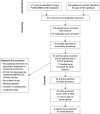Polycystic ovary syndrome and mental disorders: a systematic review and exploratory meta-analysis
- PMID: 27877043
- PMCID: PMC5108561
- DOI: 10.2147/NDT.S91700
Polycystic ovary syndrome and mental disorders: a systematic review and exploratory meta-analysis
Abstract
Background: The association between depression, anxiety, and polycystic ovary syndrome (PCOS) is still unclear. Therefore, a systematic review and meta-analysis was conducted to assess the rates of comorbid psychiatric disorders among women with PCOS compared to women without it.
Methods: PubMed/MEDLINE, Embase, PsycINFO, and Web of Science databases were searched from inception to November 27, 2015. Studies were eligible for inclusion if they were original reports in which the rates of mood (bipolar disorder, dysthymia, or major depressive disorder), obsessive-compulsive spectrum disorders, trauma- and stressor-related disorders, anxiety disorders or psychotic disorders, somatic symptom and related disorders, or eating disorders had been investigated among women with an established diagnosis of PCOS and compared with women without PCOS. Psychiatric diagnosis should have been established by means of a structured diagnostic interview or through a validated screening tool. Data were extracted and pooled using random effects models.
Results: Six studies were included in the meta-analysis; of these, five reported the rates of anxiety and six provided data on the rates of depression. The rate of subjects with anxiety symptoms was higher in patients with PCOS compared to women without PCOS (odds ratio (OR) =2.76; 95% confidence interval (CI) 1.26 to 6.02; Log OR =1.013; P=0.011). The rate of subjects with depressive symptoms was higher in patients with PCOS compared to women without PCOS (OR =3.51; 95% CI 1.97 to 6.24; Log OR =1.255; P<0.001).
Conclusion: Anxiety and depression symptoms are more prevalent in patients with PCOS.
Keywords: anxiety; depression; epidemiological survey; meta-analysis; polycystic ovary syndrome; systematic review.
Conflict of interest statement
The authors report no conflicts of interest in this work.
Figures





References
-
- Dunaif A. Polycystic ovary syndrome in 2011: genes, aging and sleep apnea in polycystic ovary syndrome. Nat Rev Endocrinol. 2012;8(2):72–74. - PubMed
-
- Ali AT. Polycystic ovary syndrome and metabolic syndrome. Ceska Gynekol. 2015;80(4):279–289. - PubMed
-
- Annagur BB, Kerimoglu OS, Tazegul A, Gunduz S, Gencoglu BB. Psychiatric comorbidity in women with polycystic ovary syndrome. J Obstet Gynaecol Res. 2015;41(8):1229–1233. - PubMed
-
- Dokras A. Mood and anxiety disorders in women with PCOS. Steroids. 2012;77(4):338–341. - PubMed
-
- Davari-Tanha F, Hosseini Rashidi B, Ghajarzadeh M, Noorbala AA. Bipolar disorder in women with polycystic ovarian syndrome (PCO) Acta Med Iran. 2014;52(1):46–48. - PubMed
Publication types
LinkOut - more resources
Full Text Sources
Other Literature Sources

